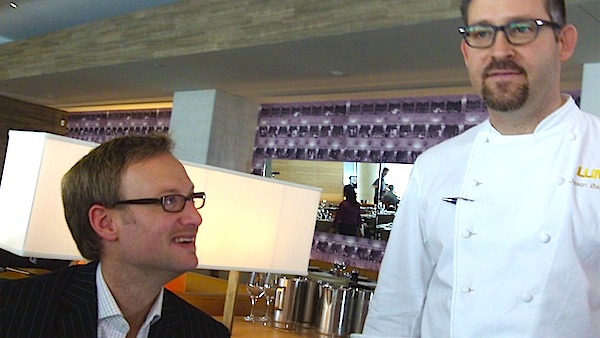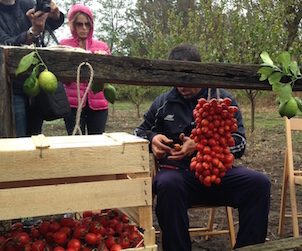Chef Joshna Maharaj is a force of nature in the Toronto good food movement. She earned her chops as The Stop’s first serious chef, and has gone on to become an activist at large, popping up here and there in the spaces where food and culture intersect. (She also regularly appears on CBC TV’s Steven and Chris show and presented her first TED Talk last year.) Presently, she’s set her sights on the food in our hospitals. Her ambition is to get Ontario hospitals to serve real, wholesome and fresh (a.k.a. locally sourced) food to their patients. After a stint working with Scarborough General, she’s now consulting to Toronto’s world acclaimed Hospital for Sick Children, working off of a special grant from The Greenbelt Foundation.
Last November, I joined Joshna and Sick Kids’ Director of Nutrition and Food Services, Tracy Maccarone, at LUMA, where Joshna led a group of about 20 SickKids employees, each involved in serving food at some level, through a series of seminars on local food production, distribution and preparation. First up was Brent Preston who, with his wife Gillian Flies, owns and operates The New Farm near Creemore. Preston explained why he farms organically and why he believes his food is not only tastier but also safer than produce grown with chemicals and fundamentally more nutritious than processed foods.
Next up was Paul Sawtell, who with his wife Grace Mandarano owns and operates 100km Foods (see Michelle Rabin’s GFR profile of the company here.) Sawtell described how his logistics company can get vegetables pulled from farmers’s fields (like Preston’s) one afternoon to a restaurant’s back door the next morning. Finally, came Chef Bangerter’s presentation, which in my humble opinion was the best since it included lunch. Bangerter took us into his kitchen where we could see produce grown on Preston’s farm, delivered by Sawtell’s truck being prepared by Bangerter’s cooks, the circle being completed, as it were, when we sat down in LUMA’s dining room to enjoy a four course meal. If there were any gastronomic doubts among the group on the value of the local food system they were erased by the heirloom beet salad, roast root vegetable soup, Kolapore Springs trout and chocolate-banana dessert.
Of course, hospital kitchens do not run like the ones in fine dining restaurants. Much of Maharaj’s morning of seminars was designed to show why real, wholesome and fresh food costs more than its industrial imitators. But, this is an era of austerity, so finding the funds for locally sourced meals made from scratch will be a challenge. As Maharaj discovered in Scarborough, hospital kitchens were converted to storage rooms, where frozen meals are microwaved by technicians, in the 1980s as a way of focusing funds on expensive equipment, personnel and administrative costs. However false that economy may have been, in health care resources are limited and demands are infinite.
Despite the challenges, Maharaj and Maccarone were optimistic that change could come. For one thing, SickKids already has a sophisticated team of nutritionists and system of meal delivery that caters to the myriad of special needs of their patients. And, there is Ministerial support for Maharaj’s mission, and although there are no specific implementation plans in effect, the idea that government funded institutions ought to serve food produced in the province is politically popular. So, well watch and see.
 Malcolm Jolley is the Executive Director of Good Food Media, the not-for-profit created to promote awareness of artisan foods in Canada and publisher of Good Food Revolution. Follow him at on Twitter at @malcolmjolley.
Malcolm Jolley is the Executive Director of Good Food Media, the not-for-profit created to promote awareness of artisan foods in Canada and publisher of Good Food Revolution. Follow him at on Twitter at @malcolmjolley.










Microwaveable nutritionally-suspect food in hospitals? I don’t even know why I question it. I know it’s the case. Sigh.
They fought so hard to get Burger King out of SickKids and yet the food they serve to patients is probably not any better.
” …the idea that government funded institutions ought to serve food produced in the province is politically popular.” AND just plain makes sense!!